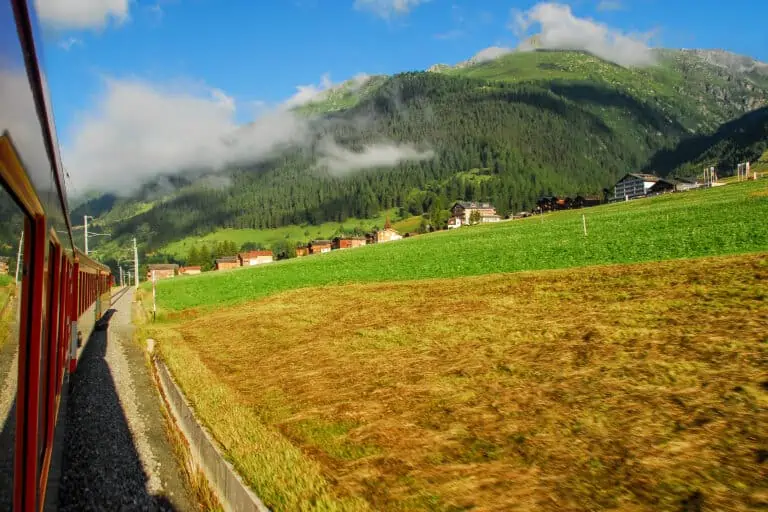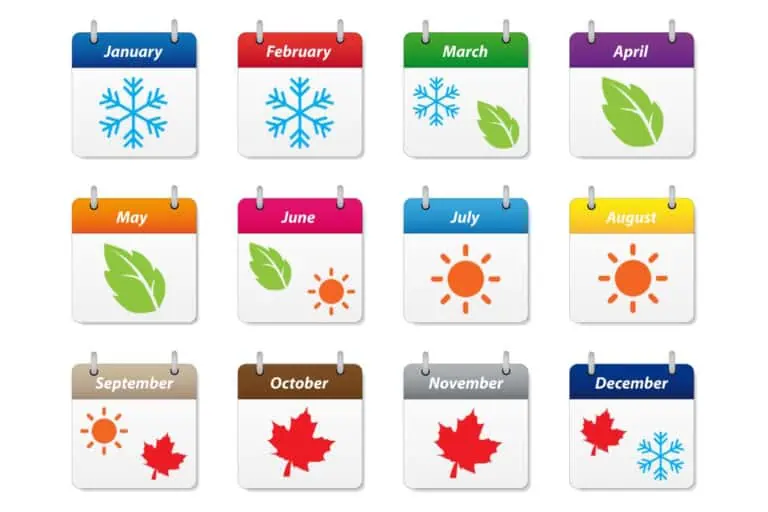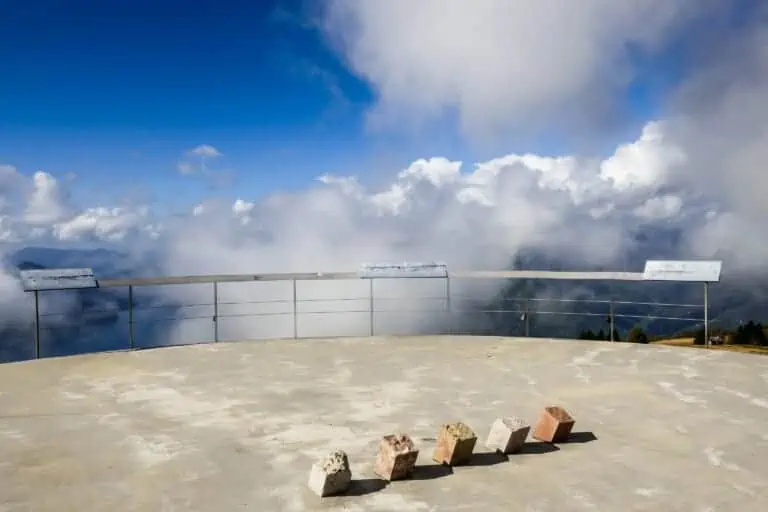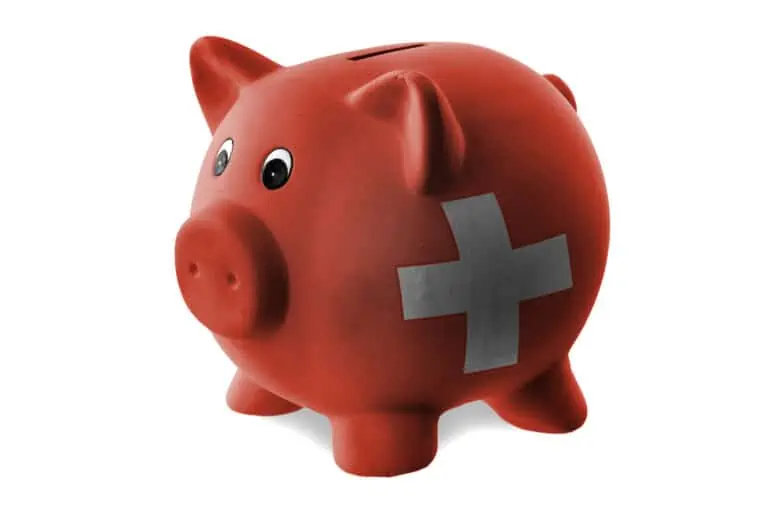Switzerland trip planner: 7 steps
If you stick to the plan below, composing an itinerary and planning your trip isn’t too difficult. Planning does take time though.
If you don’t have much time, you can best look into the sample itineraries that Arno and I created and book one of those, purchase a travel package, or have Switzerland experts make a personalized itinerary for you.
Make your own Switzerland journey in these 7 steps:
- Determine the type of trip
- Decide what you want to do
- Decide which regions or towns to explore
- Choose how to travel
- Find accommodation
- Make your bookings
- Reduce your CO2 footprint (it’s easy!)
1. Determine the type of trip
What kind of trip are you looking for? Some questions to ask yourself are:
- How many days should your holiday take?
- What’s your approximate budget?
- In which season will you be visiting Switzerland?
- Do you want to see all of Switzerland, or would it be fine to pick one or two regions and explore those thoroughly?
- Do you want to focus on the Alps or include some cities as well? I recommend not doing a city trip only, as it’s the Alps that make Switzerland special.
- Do you prefer to travel slowly, or do you want to see as much as possible?
- Is it important to stay in lively towns with plenty of shops, restaurants and events, or are you looking for small villages?
- Will this be an active vacation (hiking, biking, adventure sports, et cetera) or do you prefer leisurely activities?
2. Decide what you want to do
Now that you know what you’re looking for, you can start browsing for specific activities that match your ideas. Tips:
- Don’t hold back yet. Just create a long list of activities and worry about the details later.
- List several types of activities. This allows you to be flexible and less weather dependent. For example: if you plan to visit mountain tops only, this may be a problem if they’re all covered by clouds.
- List some actual bad weather activities (such as indoor activities and city visits) too.
3. Decide which regions or towns to explore
Locate your activities and check traveling times
You now have a wish list of activities. It’s time to take a look at the map of Switzerland. See where everything is located, and do not underestimate travel times. Distances may be short, but traveling in the mountains takes time. Traveling times by train can be found in the timetable. For traveling by car, please look here.
Choose (a limited number of) base towns
Find base towns that allow you to do most of the activities on your wish list, while keeping traveling times reasonable. My personal preference is to limit the number of base towns, as checking in and out of hotels takes time. You’d probably prefer to spend that time enjoying day trips and exploring the mountains.
One base town is fine as well!
There’s nothing wrong with picking one base town only. It’s relaxed to only have to do the unpacking and packing once, and many regions offer plenty to do and see to keep you busy for two weeks or more. The Bernese Oberland and Lake Lucerne are good examples.
If you don’t mind a few days of long travels, you can still see a fair bit of Switzerland that way. Even an isolated resort like Zermatt would be an option, but that does limit your options, especially in case of bad weather.
Allocate a number of days to each town
If possible, schedule to stay at least two full days in each base town, possibly more. That’s more relaxed and also you have some flexibility weather-wise: if it’s raining on one day, you can still do a mountain trip the next day. Take the time to enjoy a region rather than rushing from one highlight to the other.
Of course, this is all a matter of personal preference. If you are planning a scenic train trip across the country, moving around every day is no problem.
If you’re leaving by plane: spend your last night close to an airport
If you leave Switzerland by plane, you may want your last base town to be close to the airport (max. one hour of traveling), especially if your flight departs in the morning. If that’s not an option: there are comfortable airport hotels for your last night.
Find all towns and regions here
4. Choose how to travel
Basically, there are two options: travel by road or rail. Switzerland is famous for its efficient, safe and clean rail system. All major highlights can be reached by public transport. Not all highlights can be reached by car. That’s why I strongly recommend train traveling. Find a comparison between both travel modes here.
By train and bus
If you decide to travel by train, this is the time to pick a suitable rail pass, or perhaps point-to-point tickets. First, make sure that the basics of your itinerary are set:
- your start and end point (airports or the Swiss border);
- the order of the base towns where you will stay;
- the day trips you intend to make from there.
With this information, you can see whether a rail pass saves you money, or whether point-to-point tickets is better. Good to know:
- In the vast majority of cases, a rail pass saves money.
- A rail pass is more convenient too. Many passes allow you to just hop on and off trains, buses and boats without having to buy tickets for each trip.
Learn how to choose the best rail pass
By car
Unless you live in one of the surrounding countries and travel by your own car, you need to rent one. In any case, it’s good to be prepared and read about safety, traffic rules, driving in the mountains, parking, and more.
Find all tips about traveling by car here
5. Find accommodation
You’re almost done planning! You now need to find accommodation that fits your plans. Tips:
- Hotels are the best choice in most cases. If you’re staying at least 3 nights (but preferably a week or more) in one town, you can also look into apartments or homes.
- If you travel by train, be sure to book accommodation within walking distance of the rail station. We’ve selected excellent hotels near the train stations.
- If you travel by car, try to avoid accommodations in the center of larger cities. Parking options are mostly limited and always quite expensive. Consider a nearby smaller town or a hotel in the suburbs if you want to limit your expenses.
Find holiday homes and apartments
6. Make your bookings
The list below shows what you may need to book.
Your in- and outbound trip
Traveling within Switzerland
- Rail passes
- Point-to-point train tickets
- Scenic train seat reservations
- Rental cars & CO2 compensation
Accommodation
Activities
7. Reduce your CO2 footprint (it’s easy!)
Traveling is both good and bad for the Swiss alps
There are two sides to tourism. The upside is that tourism stimulates authorities to preserve nature. After all, Switzerland’s beautiful nature is the main reason to visit the country for most travelers.
The downside is that traveling causes pollution and contributes to climate change. The Alps are very sensitive to global warming.
Protect the Swiss Alps in 5 easy ways
These are the 5 cheap and easy things you can do to protect Switzerland’s nature when traveling:
- Compensate for the CO2 emission of your trip
- Travel by public transport
- Buy local, biologic products in Switzerland
- Use Swiss tap water
- Separate waste in Switzerland
1. Compensate for the CO2 emission of your trip
Will you be traveling by plane or by car? Make a small payment to compensate for the CO2 emission of those trips. It’s only a fraction of your holiday budget and you’ll make a difference! There are several options:
- Go to co2.myclimate.org/calculate_emissions, calculate the emission of your trip and choose from the various ways to compensate.
- Use the CO2 offsetting that may be offered by your airline or car rental company.
- Donate to a verified local CO2 offset organization.
Examples of CO2 offset prices for your Switzerland trip
- Driving from Amsterdam to Zurich and back in a mid-range car with ethanol fuel causes 0.54 tonnes of CO2. A donation of CHF 14 makes your trip eco-friendly.
- A flight from London to Zurich and back causes 0.45 tonnes of CO2. A donation of CHF 11 makes your trip eco-friendly.
- A flight from New York to Zurich and back causes 2.3 tonnes of CO2. A donation of CHF 57 makes your trip eco-friendly.
- A flight from Singapore to Zurich and back causes 4.3 tonnes of CO2. A donation of CHF 107 makes your trip eco-friendly.
Calculate the amount for your trip: co2.myclimate.org/calculate_emissions
What is Myclimate?
Myclimate is a foundation that emerged in 2002 from a project by students and professors at the Zurich university for technology and natural sciences (ETH). Their goal is to protect the climate (and therefore mankind), by creating a society with a high standard of living but very low greenhouse gas emissions.
For us as travelers that means: make our CO2 footprint as small as possible, and compensate for the remaining emission.
More information: www.myclimate.org/information/faq
What Myclimate uses your donation for
If you donate to Myclimate, your money will be used to offset your CO2 emission. They have many projects around the world to do so. For example, Myclimate invests in reforestation, energy efficiency, renewable energy and climate education.
2. Travel by public transport
If you can, avoid traveling by plane or car on your way to Switzerland. Choose the train. If you can’t, you can compensate for the CO2 emission of your trip. If you fly, take a non-stop flight if possible (most fuel is burned during take-off and landing).
For your travels in Switzerland, I recommend public transport instead of a car. The Swiss train system is one of the best in the world: it’s clean, safe and comfortable. If you prefer to travel by car, please compensate for the CO2 emission.
3. Buy local, biological products in Switzerland
This is quite easy in Switzerland. Many Swiss supermarkets offer a wide range of local, biological products. The production chain and transport of such products have less impact on the environment.
4. Use Swiss tap water
Do not buy bottled water. Swiss tap water is just as good and results in a much smaller CO2 footprint.
5. Separate waste in Switzerland
Switzerland has an extensive system of separating waste. As a tourist, you can contribute to this. You’ll support recycling and you’ll keep Switzerland the clean country it is!
This is how you can separate waste as a tourist:
- If you have plastic waste, batteries, chemicals, paper/carton, glass, plastic, textile, oil/fat or aluminum coffee pods, don’t throw these in regular bins. Instead, find out at which location(s) in your base town waste is collected and bring it there. Hotel staff, the landlord of your rental apartment or the local tourism agency can provide you with detailed locations. These locations are called ‘Abfall-Sammelstelle’ or ‘Wertstoff-Sammelstelle’ in German. They’re often found at central points like the railway station, shopping center, post office, and even supermarkets.
- If you’re staying in a rental home or apartment, the remaining materials should be put in special bags for the local waste processing firm to collect it. An additional tax (‘Sackgebühr’) on these bags pays for the collecting and waste processing. That’s why they’re pretty expensive. If you just need a couple of bags while staying in a vacation rental, your landlord will usually provide some. These bags can often not be found in the shopping section of the supermarket, but only at the checkout or the supermarket kiosk. It is common practice to stuff in as much waste as possible and then put it in a nearby container or place it on the roadside on the designated day.
- If you stay in a hotel, the hotel will largely take care of collecting and separating your waste. But you can still separately dispose of the basic stuff like plastic bottles.
- Don’t throw away waste while you’re traveling or hiking. Keep it with you and dispose of it in public bins at railway stations, supermarkets and other central points. Larger railway stations provide separate bins for paper, glass and plastic. Use those if you can.
Switzerland travel planning FAQ
-
How many days are enough to visit Switzerland?
3 to 4 days is a reasonable minimum length for a Switzerland holiday. This allows you to get a glimpse of 1 or 2 regions and towns, including your inbound and outbound trip.
If you want to explore more of the country, count on 1 to 2 weeks. In a 1-week trip you can either explore 1 region thoroughly, or make a quick tour through 2 or 3 regions. A 2-week trip allows you to visit many of Switzerland’s most famous cities and alpine regions, and to enjoy diverse activities.
A 4-week stay is ideal to travel around most regions of Switzerland and to visit many, or even all, sites on your wish list.
-
Is one day enough to visit Switzerland?
It is possible to make a beautiful journey across Switzerland in one day, in which you’ll see various regions and landscapes. If you plan well, you’ll also be able to make a short stop in one of Switzerland’s attractive towns.
A 1-day journey does not do justice to Switzerland’s diversity and gorgeous nature though. You’ll get a much better experience if you get out of the train or car and explore some towns, mountains or lakes. That’s why I recommend 3 to 4 days at least.
Examples of 1-day trips across the country from south to north or the other way around: Lugano-Lucerne-Zurich, Tirano-Chur-Zurich, Domodossola-Brig-Interlaken-Lucerne-Zurich, Geneva-Fribourg-Bern-Basel/Zurich, Geneva-Neuchatel-Biel-Basel/Zurich.
Examples of 1-day trips across the country from west to east or the other way around: Geneva-Martigny-Brig-Chur, Geneva-Montreux-Interlaken-Lucerne-St. Gallen, Basel-Bern-Interlaken-Lucerne-St. Gallen.
Famous scenic train routes such as the Glacier Express, Bernina Express and GoldenPass can also be done in one day.
-
When should I visit Switzerland?
The best time for a Switzerland holiday depends on your preferences. Overall, September is a good month. I can advise April-May-June as well. Find details per season here.
-
Is it easy to visit Switzerland on your own?
Yes, Switzerland is very tourist-friendly. It’s easy to create your own itinerary and to travel without a guide. Public transport is extremely efficient and easy to navigate.
But if you don’t have time to plan your trip, or if you don’t want to worry about your daily travel schedule, there are alternatives. Have Switzerland experts create a tailor-made itinerary for you, book a self-guided package or book a guided holiday.
Enjoy your stay!
Hopefully, this guide has been useful to you. If you’re in doubt about your itinerary, please feel free to post your questions in our community. You may also like to post a trip report once you’re back. We really appreciate that, and so do other travelers.
Enjoy your stay in the Swiss Alps!
More practical planning tips

Itineraries

Best time to visit



